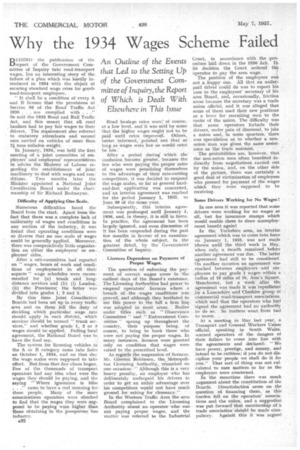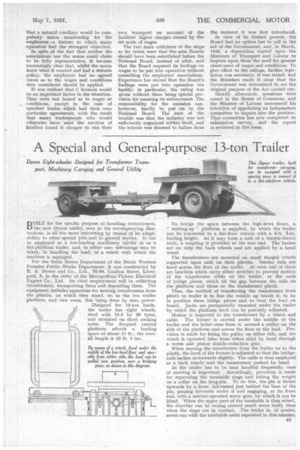Why the 1934 Wages Scheme Failed
Page 34

Page 35

If you've noticed an error in this article please click here to report it so we can fix it.
An Outline of the Events that Led to the Setting Up of the Government -Committee of inquiry, the Report of Which is Dealt With -Elsewhere in This Issue BEIIIND the publication of the report of the Government Committee of Inquiry into road-transport wages, lies an interesting story Of the failure of a plan which was hastily introduced in 1934 With the abject of securing standard wage rates for .goods toad-transport employees, " It shall be a condition of every A and B licence that the provisions of Section 93 of the Road Traffic Act 1930 . . . are complied with . . ." So said the 1933 Road and Rail Traffic Act, and this meant that all road hauliers had to pay -fair wages to 'their drivers. The requirement also referred to statutory attendants and second men carried on vehicles of more than 24 tons unladen weight.
In January, 1934, was held the first meeting of a joint committee of 'employers' and employees' representatives tO advise the Minister of Labour regarding the establishment of joint machinery to deal with wages and conditions. Two months later the Minister appointed a National Joint Conciliation Board under the chairmanship of Sir Richard Redmayne.
Difficulty of Applying One Scale.
Numerous difficulties faced the Board from the start. Apart from .the fact that there was a complete lack of tunlotmity of wages and conditions in any section of the industry, it as found that operating conditions were so diverse that no one scale of wages could be generally applied. Moreover, there was comparatively little organization on either the employers' or employees' sides.
After a sub-committee had reported on " wages, hours of work and conditions of employment in all their aspects" wage schedules were recommended for fa) trunk and longdistance services and (b) (i) London, (ii) the Provinces; the latter was divided into grades 1, 2 and 3.
By this time Joint -Coneilistion Boards had been set up in every traffic area and on them fell the duty of deciding which particular wage rate should apply in each district, which services should be termed " trunk services," and whether grade 1, 2 or 3 wages should be applied. Failing local agreement, the National Board was to have the final say.
The system for licensing vehicles in the A or B category came into force on October 1,, 1934, and on that -day the wage scales were supposed to take effect. Bist.from that day chaos began. Few of the thousands of transport operators had any idea what were the wages they should be paying, and the saying "Where ignorance is bliss • . ." came to have a real meaning for. these people. Many of the more conscientious operators were shocked to find that the wages they were .supposed to be paying were higher than those obtaining in the prosperous bus industry.
is'32
Road haulage rates were of course, at a low level, and it was said by some that the higher wages ought not to be paid until rates. improved. Others, better informed, pointed out that so long as wages were low so would rates be low.
After a period during. which the confusion 'became greater, because the few who were paying the proper rates of wages were penalizing themselves to the advantage of their rate-cutting competitors, it was decided to suspend the wage scales, so far as general hardand-fast application was concerned, and an interim agreement was reached for the period January 1, 1935, to June 30 Of the same year.
Subsequently, this interim agreement was prolonged until January -1, 1936, and, in theory, it is still in force. In practice, the agreement has been largely ignored, and even discussion of it has been suspended during the past few months in favour of an examination of the whole subjeot, in the greatest detail, by the Government Committee of Inquiry.
Licences Dependent on Payment of Proper Wages.
The question of enforcing the payment of correct wages arose in the earliest -days of the Board's existence. The Licensing A-uthorities had power to suspend operators' licences where a breach of the wages conditions was proved, and although they .hesitated to use this power to the full a firm line was adopted in most areas. Bodies under titles such as "Observance Committee" and "Enforcement Committee" sprang up throughout the country, their purpose being, of course, to bring to book those who were not paying the proper wages. In main,' instances, licences were granted only on condition that wages were raised to the prescribed level.
As regards the suspension of licences, Mr. Gleeson Robinson, the., Metropolitan Licensing Authority,. remarked on one occasion: "Although this is a very heavy penalty, an employer who has deliberately underpaid his drivers in order to get an unfair advantage over his competitors would not have much ground for asking for clemency."
In the Western Traffic Area the area Board complained to the Licensing Authority about an operator who was not paying proper wages, and the matter was referred to the Industrial
Court, in accordance with the pros cedure laid down in the 1930 Act. Its its decision the Court ordered the . operator to pay the area wage.
The position of the employees was not a happy one. All that an underpaid driver could do was to report his case to the employees' secretary of his area Board, and, occasionally, friction arose because the secretary was a trade union official, and it was alleged that some of them used their new positions as a lever for recruiting men to the ranks of the union. The difficulty was that some operators forbade their drivers, under pain of dismissal, to join a union and, in some quarters, there was speculation as to whether a nonunion man a-as given the same assistance as the trade unionist.
The probabilities are, however, that the non-union men often benefited indirectly from negotiations .earried out by the union, and, on the other side of the picture, there was certainly a good deal of victimization of -employees who pressed for payment of the wages which they were supposed to be receiving.
Some Drivers Working for No Wages I In one area it was reported that some drivers were working for no wages at all, but for insurance stamps which would enable them to draw unemployment benefit again!
In the Yorkshire area, an interim agreement which was to come into force on January 1, 1935, was not made khown until the third week in May. when only a month remained before another agreement was due. The latter agreement had still to be considered. On another occasion an agreement was reached between employers and employees to pay grade 1 wages within a radius of 10 miles of St Ann's Square, Manchester, but a -week after the agreement was made it was repudiated ,by a Lancashire and Cheshire group of commercial road-transport associations, which said that the operators who had signed the agreement had no authority to do so.. So matters went from bad to worse.
_ At a meeting in May last year, a Transport and General Workers Union official, speaking in South Wales, warned operators of the dangers of their failure to come into line with the agreements and declared: "We have power, prestige, and money, and intend to be ruthless; if you do not discipline your people we shall do it for you." That sort of thing was not calculated to ease matters so far as the employers were concerned. In the meantime there was much argument about the constitution of the Boards, Dissatisfaction arose on the question of financing them, as this burden fell on the operators' associations and the union, and a suggestion was put forward that membership of 'a trade association should be made compulsory. Againgt this it was argued that a natural corollary would be compulsory union membership for the employees--a feature to which many operators had the strongest objection.
In spite of the fact that neither the associations nor the union could claim to be fully representative, it became increasingly clear that, whilst the union knew what it wanted and had a definite policy, the employers had no agreed views as to the wages and conditions they considered should be applied.
It was realized that C licences would be an important factor in the situation. They were not bound as to wages or conditions, except in the case of specified trades which had their own particular agreements, with the result that many tradespeople who would otherwise have used the services of hauliers found it cheaper to run their own transport on account of the hauliers' higher charges caused by the set scale of wages.
The two main criticisms of the steps so far taken were that the area Boards should have been established before the National Board, instead of after, and that the Board required its findings on wages to be put into operation without consulting the employers' associations. Experience has shown that the Board's findings were put into operation too hastily: in particular, the ruling was given without there being special provision for ensuring its enforcement. The responsibilityfor the omission can, however, hardly be put on to the National Board. The root of the trouble was that the industry was not sufficiently organized :within itself,_ and the scheme was doomed to failure from
the moment it was first introduced.
In view of its limited powers, the Board had no option but to call in the aid of the Government, and, in March, 1936, a deputation waited upon the Ministers of Transport and Labour to impress upon them the need for greater observance of wages and conditions. To give effect to the rulings, further legislation was necessary, it was stated, and the Ministers made it clear that the Government was determined to see the original purpose of the Act carried out.
Shortly afterwards, questions were raised in the House of Commons, and the Minister of Labour announced his intention of appointing an independent committee to inquire into the position. That committee has now completed its exhaustive survey, and the report is reviewed in this issue.




















































































